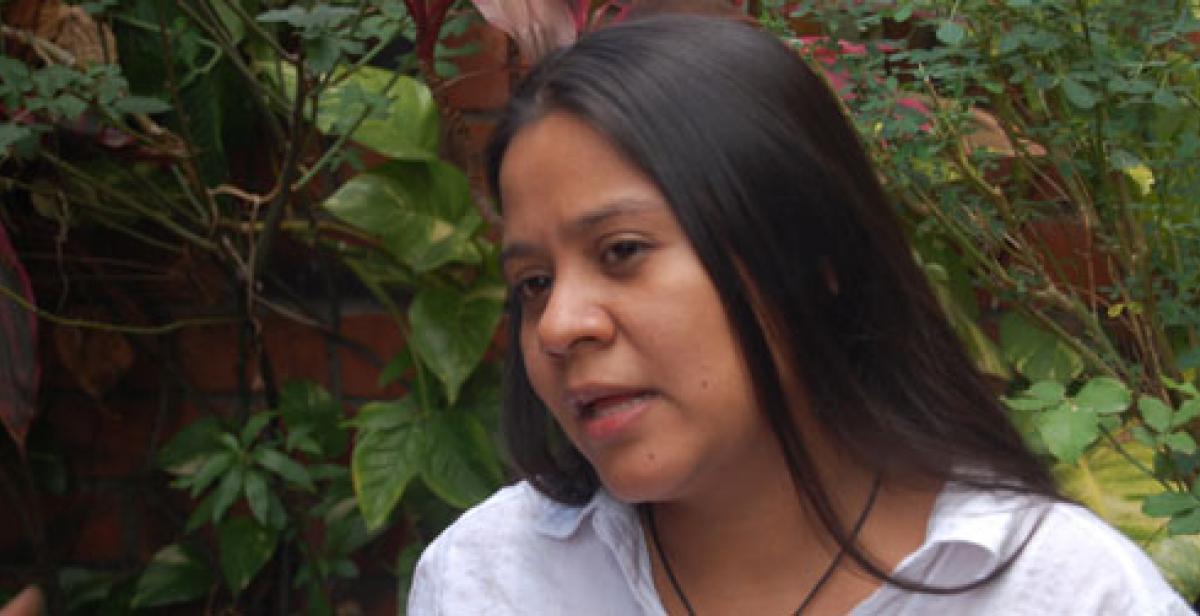“Social movements here [in Central America] create new ideas and are an inspiration, not only for Latin America, but for the whole world.” So said Eva Ekelund from the World Lutheran Federation in her opening speech at a Mesoamerican Climate Justice Campaign conference on 16-17 February.
As for the rest of the world – the global North – Angel Ibarra of Progressio partner UNES said in his presentation: "They don’t even mitigate, and we in turn are obliged to adapt, in a scenario in which adaptation isn’t even possible."
Angel challenges Mesoamericans to take concrete action at a local level to adapt to climate change, but also to develop a deeper questioning and critique about the lack of political will and legally binding agreements under the UNFCCC – and move towards demanding compensation for the ecological debt that northern countries have with southern ones.
The People’s Summit
In June the UN Conference on Sustainable Development – known as Rio +20 – will bring together officials from all over the world to discuss two central themes: 1) The ‘green economy’ in the context of sustainable development and poverty eradication, and 2) an institutional framework for sustainable development.
Given the limited progress that has been made in the UNFCCC framework on the climate justice agenda, and the serious problem civil society faces in Central America, the Mesoamerican Climate Justice Campaign has joined with other social movements around the world to participate in “The People’s Summit”. This will be a space for social movements to gather during the official conference to share and speak out on current global problems such as the climate crisis, militarisation, and migration, among others.
Engage to change
At the February Climate Justice conference, Martha Flores (pictured) of the Nicaraguan social movement Another World is Possible said: "Rio+20, and the next COP to be held in Dakar, are points along the way of a longer process. As social movements, we recognise that our struggle is much broader than these meetings, but we have to participate in these official spaces to show that we do not agree with the official process, which for the past 18 years has led to a commodification of the climate and our lives. "
Conference participants shared experiences from a local level of how the ‘green economy’ plays out in their countries, manifesting in projects such as REDD +, ‘green’ mining, monocrops, and hydroelectric dams.
The current ‘green economy’
A concrete example from the region is the struggle of rural communities in the Lower Aguan region in Honduras, who face forced eviction from their land by the self-proclaimed land owner in order to plant African Palm, which is used to create biofuels. This landowner receives credits under the Clean Development Mechanisms (CDM) which were developed under the UNFCCC.
Meanwhile, communities that struggle to defend their land rights and protect the natural resources that are vital for their survival face constant repression. While projects that are proposed in the logic of “green economy” may seem a viable option against the environmental crisis, they are taking a large toll on the people and ecosystems of Mesoamerica.
Building alternatives
"The green economy seems attractive, and this is dangerous. It is very important to recognise that that the green economy is a wolf dressed in sheep’s clothing – like Lucifer pretending to be light but he is not light," commented Bishop Medardo Gomez of the Salvadoran Lutheran Church.
Each member of the campaign has now returned to his or her country to further develop strategies and actions that strengthen the resistance to what are seen as false solutions, and to foster joint strategies and proposals for sustainability to reduce the concrete impacts on the lives of people in Mesoamerica.
Maggie Von Vogt is a Progressio development worker working with UNES (the Environmental Movement of El Salvador). Photo: Martha Flores (photo © Maggie Von Vogt/Progressio)
Read why Progressio is calling for “not just a green economy, but a green and fair economy” in its response to the Zero Draft document of the Rio+20 conference.
Click here (opens in a new window) to listen to a presentation by Mercy Palacios on Green Economy (in Spanish)
To learn more about the struggle in the Lower Aguan Region of Honduras visit the Movimiento Campesino del Aguan website (in Spanish) or the m.i.o.aguan website (in English)
Click here (opens in a new window) to listen to the presentation on Climate Change and the UNFCCC by Angel Ibarra (in Spanish)
Click here (opens in a new window) to see an interview with Martha Flores from Jubilee South Central America on Green Capitalism and Rio+20 (in Spanish)



